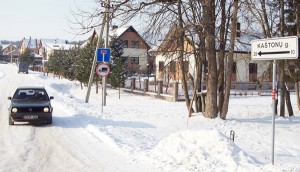- February 3, 2012
- 494
Lithuanian kindergarten children forced to go to Polish schools

Editorial office received a letter from Rzesza near Vilnius informing that a group of local Lithuanian activists is trying to solve the problem of the lack of places in a Lithuanian kindergarten at the expense of a Polish school.
The ways of solving this problem – starting with calling on a website ending with insulting comments on Facebook – have agitated the school community of local Poles. Below, we are printing a full text of the received letter, at the same inviting everyone to a broader debate on this topic.
„We invite young families to defend their interests on the matter of a Lithuanian kindergarten in Rzesza!” – so is the name of the article of the council of Rzesza community on the internet portal www.rieses.info.
The number of inhabitants of Grand Rzesza is continuously growing. More than 150 children of Lithuanian nationality are waiting for a place in the Lithuanian kindergarten in Rzesza, and this is why a group of local activists is trying different ways to solve the problem.
No one would be surprised to know that the inhabitants of Lithuanian nationality want to secure the educational opportunities at the place, situated as closest as possible from their place of living. However, the ways of solving this problem are puzzling and alarming, starting with calling on a website ending with insulting comments on Facebook.
Members of the Rzesza community council suggest opening kindergarten groups with Lithuanian as a language of instruction in…the Polish school. For that purpose, they began an action aiming at collection of signatures, they have also turned with an appropriate offer towards the self-government of the Vilnius district: why is it suggested that the young Lithuanian parents should start taking care of their children’ interest at the expense of Polish children? Why did the TV station „Lietuvos rytas”, which is currently preparing a reportage on this matter, first visited us today, namely the Polish school, and not the Lithuanian junior high school or the Lithuanian kindergarten in Rzesza? One could ask whether under the guise of concern about the future of their pupils, they are attempting to eradicate the Polishness in this area. After all, it can be most easily done, as the painful historical experience shows, through education, and the most susceptible are indeed children at the age of kindergarten.
In order to present the existing situation in more concrete way, I will now quote few facts from the history of our school.
The data from archives indicates that the school in Rzesza was established in 1864. In the course of next hundred years students were learning in Rzesza in different buildings and different languages (Polish, Russian, and then Lithuanian).
A new building was built in 1965, but the initial classes were still situated in the old, wooden house. Russian-Polish kindergarten was open in 1979. Unfortunately, it was closed in 1992, and the classes with Lithuanian as a language of instruction, who got separated from the mixed primary school, were moved to this building. A new school for Lithuanian children was built in Rzesza in 1998, currently a junior high school. In 2005, a third floor was added to this beautiful, modern and well-equipped educational post.
Lithuanian community really wanted to preserve the building of the old kindergarten for their own needs. However, school directory and parents from our school could not come to terms with the fact that the youngest children are still learning in anti-sanitary conditions at the old school. Thanks to consistent and desperate efforts of the school community, as a result of a favourable attitude and financial support of the self-government of Vilnius Region, they managed to re-gain and renovate this building. Currently, it has initial classes, 2 groups of mixed kindergarten teaching, psychologist’s and social educator’s office, cabinet of healthcare worker, music and arts studio, small canteen and assembly hall, which functions as a sports hall at the same time.
It is demanded that the Polish school should share some of its rooms from Lithuanian kindergarten groups. Photo: Marian Paluszkiewicz
A positive fact is that the number of Polish children in Rzesza and nearby localities is constantly growing. Currently, we have 30 applications from parents asking for admission of their children to the kindergarten for the next school year. Most of applications come from Polish families; however the school also does not refuse educational services to Lithuanians. Those few children from Lithuanian or mixed families are a confirmation of this fact. The parents are satisfied from the level of teaching. One cannot then accuse the school that it lacks tolerance or willingness to cooperate and searching for compromises.
To sum up the existing situation, one should note that there is a perceived lack of competence and elementary moral rules in the behaviour of the Rzesza activists. Perhaps, it would be worth considering other courses of action? One of them could be opening up of similar kindergarten groups at the Lithuanian junior high school in order to prepare candidates for that school. It is impossible to understand why the Lithuanian Rzesza community chooses ways of acting, which raise feeling of insecurity and hostility among representatives of the two nations.
When it comes to material matters, it is difficult for our small school to compete against the modern Lithuanian junior high school. However, the school community makes every effort to develop the only Polish school in the neighbourhood, to make it secure and attractive for students and their parents. This is why we will not let destroy the thing that is very dear to us, we will not let destroy the only centre of Polishness in grand Rzesza!
Alicja Łukaszewicz
president of the Primary School Council in Rzesza
http://kurierwilenski.lt/2012/02/03/na-sile-do-polskiej-szkoly-litewskiego-przedszkolaka/
Tłumaczenie Małgorzata Juchniewicz w ramach praktyk w Europejskiej Fundacji Praw Człowieka, www.efhr.eu. Translated by Małgorzata Juchniewicz within the framework of a traineeship programme of the European Foundation of Human Rights, www.efhr.eu.

